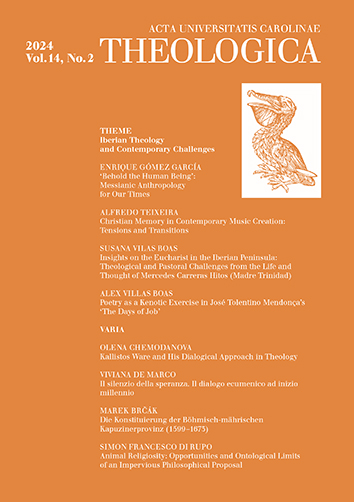AUC Theologica is a peer-reviewed journal for theology published twice a year. As we publish original papers in English, German, French, and Italian, our mission is to serve as a platform both for Czech researchers, who can present their research results in these languages, and for international contributors, who are invited to enter the academic theological discussion in the heart of Europe.
The journal focuses on a wide range of theological disciplines, such as systematic theology, biblical studies, patristic studies, pastoral and spiritual theology, religious education, church history, etc. Within these fields, the journal seeks to reflect the current theological questions and problems, which often requires interdisciplinary approaches. Supporting the intersection of various theological disciplines, we thus also welcome theological papers touching other academic fields including philosophy, sociology, literary studies, and science.
Each issue consists of two sections. The thematic section presents papers of the same focus. The section called ‘Varia’ invites papers dealing with various theological themes from the perspective of all Christian traditions. Our current and past issues are approachable for free on this website in the form of Open Access.
AUC THEOLOGICA, Vol 11 No 2 (2021), 59–75
Klaus Hemmerle on the Trinitarian Ontology of the Human Person
Eduard Fiedler
DOI: https://doi.org/10.14712/23363398.2022.4
published online: 03. 06. 2022
abstract
The 20th-century quest for a Trinitarian ontology was associated with a critical reconsideration of the modern philosophy of the subject. However, this reconsideration did not reject the question of subjectivity itself. It rather rejected any narrowed ontological assumptions that would identify the very ground of subjectivity with a univocal eidetic structure of being. In its most advanced forms, the modern and postmodern philosophy of the subject proved to be radically structuralist, relational, or even differentialist. While many attempts at Trinitarian ontology have faced this challenge either by adapting Christian dialogical personalism or reviving older metaphysical traditions and notions, e.g., the analogy, the participation, and the concept of the subsisting person, Klaus Hemmerle emphasised in his Theses Towards a Trinitarian Ontology (1976) above all the ontological primacy of the relational self-giving (Sich-Geben), explicated phenomenologically. Every subsisting being, including the human person, gains its concrete contour only from within this relational process. But does this relational reappearance of the human person mean its self-alienated completion, or rather its complete alienation? How can this relational account of the human person be related to older metaphysical, theological, and personalistic traditions? Does Hemmerle avoid the dangerous dissolution of the human person as a mere processual moment of the whole community and the world?
keywords: Klaus Hemmerle; Trinitarian ontology; Trinitarian metaphysics; Trinity; Human person; Substance; Structure; Subject; Relation; Love; Community; Communio; Relational ontology; Christian personalism

Klaus Hemmerle on the Trinitarian Ontology of the Human Person is licensed under a Creative Commons Attribution 4.0 International License.
148 x 210 mm
periodicity: 2 x per year
print price: 100 czk
ISSN: 1804-5588
E-ISSN: 2336-3398
